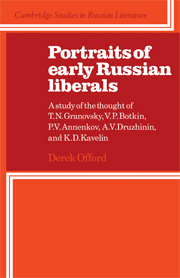 Portraits of Early Russian Liberals
Portraits of Early Russian Liberals Book contents
- Frontmatter
- Contents
- Foreword
- Note on dates, transliteration and use of Russian terms
- 1 Russian intellectual life in the 1840s and 1850s
- 2 Timofey Nikolayevich Granovsky (1813–1855)
- 3 Vasiliy Petrovich Botkin (1811–1869)
- 4 Pavel Vasilyevich Annenkov (1813–1887)
- 5 Aleksandr Vasilyevich Druzhinin (1824–1864)
- 6 Konstantin Dmitriyevich Kavelin (1818–1885)
- Conclusion
- Key to abbreviations used in the notes
- Notes
- Selected bibliography
- Index
1 - Russian intellectual life in the 1840s and 1850s
Published online by Cambridge University Press: 06 July 2010
- Frontmatter
- Contents
- Foreword
- Note on dates, transliteration and use of Russian terms
- 1 Russian intellectual life in the 1840s and 1850s
- 2 Timofey Nikolayevich Granovsky (1813–1855)
- 3 Vasiliy Petrovich Botkin (1811–1869)
- 4 Pavel Vasilyevich Annenkov (1813–1887)
- 5 Aleksandr Vasilyevich Druzhinin (1824–1864)
- 6 Konstantin Dmitriyevich Kavelin (1818–1885)
- Conclusion
- Key to abbreviations used in the notes
- Notes
- Selected bibliography
- Index
Summary
Nicolaevan Russia; the growth of Russian literature; Chaadayev's ‘Philosophical Letter’
‘“Despotism still exists in Russia: it is the essence of my government, but it accords with the genius of the nation’”, Nicholas I told the French Marquis de Custine, who travelled extensively in Russia in 1839. Custine's own observations abundantly confirmed the emperor's judgement. He found a régime under which everyone and everything depended upon the favour of one man. Deprived of liberty, the Russians had developed a ‘taste for servitude’; ‘great and small’ alike were ‘drunk with slavery’. Everywhere the traveller could find ‘compulsory manifestations of submission’; he was among a ‘nation of mutes’, sixty million automata awaiting the ‘wand of another enchanter’ before they could again enjoy life. Existence would become ‘insupportably dull to the individual who should allow himself to reflect’, for to converse was to conspire, to think was to revolt and thought was not merely a crime but also a misfortune. The Russians had pretensions to ‘good manners’ and Western education, to be sure, for they were an ‘imitative people’ with a ‘general passion for novelties’ and were ‘incessantly occupied with the desire of mimicking other nations’, which they did ‘after the true manner of monkeys’. Nevertheless Russia remained ‘more nearly allied to Asia than to Europe’, a ‘monstrous compound of the petty refinements of Byzantium, and the ferocity of the desert horde’. She was a nation of ‘enrolled and drilled Tartars’, ‘a barbarism plastered over, and nothing more’.
- Type
- Chapter
- Information
- Portraits of Early Russian LiberalsA Study of the Thought of T. N. Granovsky, V. P. Botkin, P. V. Annenkov, A. V. Druzhinin, and K. D. Kavelin, pp. 1 - 43Publisher: Cambridge University PressPrint publication year: 1985


